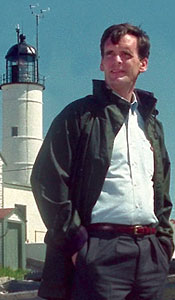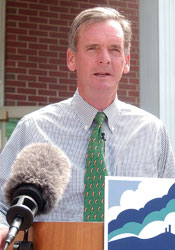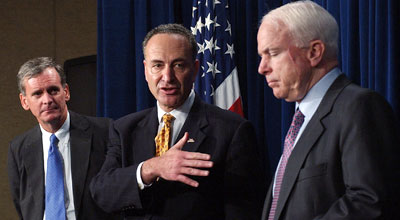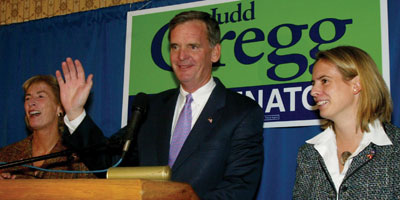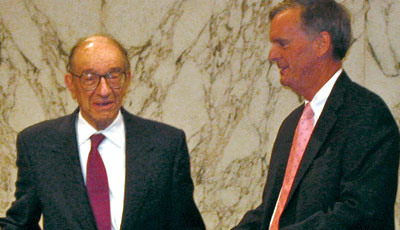|
|
 |
 |
 |
 |
|
COVER STORYThe Face of New HampshireCongressman, governor and now a third-term U.S. senator, Judd Gregg ’69 is one of the country’s most influential conservatives.By Jonathan Lemire ’01
He is the son of a New Hampshire governor. He has devoted his life to New Hampshire politics and was the first elected official in state history to serve as a U.S. congressman, governor and U.S. senator. He was elected to his third Senate term in November with the highest number of votes in any election in the Granite State’s history. Now that the Old Man in the Mountain rock formation has come tumbling down from its perch, a convincing case could be made that Judd Gregg ’69 may be the face of New Hampshire. A staunch conservative who has never lost a political race, Gregg chairs the Senate Budget Committee and has helped distribute funding for homeland security, helped author and pass the controversial No Child Left Behind Act (as chairman of the Senate Education Committee) and — showing that he can act as well as legislate — played Al Gore and John Kerry during President George W. Bush’s debate preparations in the 2000 and 2004 campaigns. But Gregg is far too busy negotiating the corridors of power in Washington, D.C., and Concord, N.H., to reflect on his legacy. “I don’t spend much time looking back. I’d much rather look forward,” says Gregg, 58, early one morning while racing to a terrorism defense drill. “My focus is always the next task at hand.” Throughout his political life, supporters say, Gregg has never lost sight of where he’s from or sacrificed his principles for the sake of political expediency. “Part of the reason why he wins is that he’s not afraid to lose,” says Tom Rath, New Hampshire National Republican Committeeman. “He’d rather lose for the right reasons than win for the wrong ones. He has a core set of principles that have, by and large, guided his career. He’s never compromised himself.”
Gregg’s commitment to public service is, literally, in his blood. His father, Hugh Gregg, served as New Hampshire governor from 1953–55, so the household that Judd was born into in 1947 was full of talk of hard work and giving back. After growing up in Nashua, an industrial mill town, Gregg excelled as a student at Phillip Exeter High School, an elite New Hampshire prep school. As he started thinking about college, he realized that he wanted a different experience for his undergraduate years. “My prep school was insular,” Gregg notes. “All the students were men from similar backgrounds. The schools in [New York] city had a lot to offer in their diversity. “I was looking for the biggest city I could find,” he recalls with a laugh. “I certainly found that in New York City.” Gregg readily admitted, however, that his selection of Columbia College was based more on instinct than research. “I just looked at [Columbia’s] catalog. I never visited the campus,” he said. “I didn’t need to. I knew what I wanted, even if I had no idea what it would look like.” What Gregg wanted was energy and variety, things that he found on Morningside Heights in abundance. Though the journey from his small New England town to his new home was only 233 miles, Morningside Heights felt a world away from the sheltered prep-school life he left behind.
Which was exactly the point, Gregg said. “If I wanted to just go to a college, I would have gone to Dartmouth, Yale or Cornell,” he says. “I wanted to experience New York City, and that included the energy of its protests about civil rights, the women’s movement and Vietnam.” An English major, Gregg was struck with the sweeping brushstrokes of knowledge that the Core Curriculum provided. “I took a series of courses that I was interested in, but the Core Curriculum really shaped my Columbia experience,” he said. “It pretty much taught us the basics of everything. I was drawn in by subjects that I knew nothing about.” Art history, in particular, captured Gregg’s attention, and he delighted in forays into Manhattan’s mammoth museums, with his professor as tour guide. “We were taught by leading world experts who took us to the world’s best museums,” he said. “I found that fascinating.” While those field trips were organized by the school, they were consistent with Gregg’s passion for touring the city. He viewed Manhattan as an extension of Columbia’s campus, and Gregg now jokes that his real major at Columbia was “subway studies,” due to his extensive weekend exploration. Gregg soaked in the city’s energy, including its fevered political activism. He attended “happenings” in Central Park and marched with classmates in feminist rallies. He also had an up-close perspective of the campus demonstrations of 1968, which put Columbia in the harsh glare of the national media spotlight.
“The intensity of the period was rather overwhelming,” he says. “Being on campus when the demonstrators took overbuildings and the police came was an experience. There was physical violence and intellectual fervor. Classes were cancelled, but as an afterthought — they weren’t anyone’s focus.” Although the demonstrations were the definitive event of his time on the Heights, Gregg took far more than those powerful memories with him when he returned to New England after graduation. “I remember [the school] fondly,” he says. “Columbia was a great experience and helped lay a great foundation. I got exactly what I wanted from Columbia, and I began to see the world in a different light.” After receiving a law degree from Boston University in 1975, Gregg did not serve in the military due to a medical issue and instead returned to New Hampshire to practice law. Leaving big cities behind to again live in a small town, Gregg grew more convinced then ever of individuals’ rights and soon realized his calling was to follow in his father’s footsteps and enter New Hampshire politics. “I lived in a small city [in New Hampshire] and became head of the United Way and other charitable organizations. That made me realize, quickly, that in order to have an impact in the community, it had to be with the government.”
Gregg’s political career began when he was elected as a delegate to the state Constitutional Convention in 1974. He got his first taste of national politics coordinating the New Hampshire presidential primary campaigns of Ronald Reagan in 1976 and George H.W. Bush in 1980. Though both candidates lost their respective primary bids, Gregg was hooked on conservative politics. After a short stint on the New Hampshire Governor’s Executive Council, an advisory group often in conflict with the executive branch in Concord, Gregg ran for Congress in 1980. He was elected by a large margin and spent eight years in the House of Representatives, with much of that time on the Ways and Means Committee. Growing restless in the House, Gregg took a political risk and declined to ask voters to return him to Washington, D.C., in 1988. Instead, he asked them send him to the state house in Concord, and voters from Londonderry to Dixville Notch rewarded him with their governorship. A dedicated fiscal conservative, Gregg set the tone for his administration in his inaugural address, pledging fidelity to the “New Hampshire tradition” of free enterprise (there are no state-wide sales taxes or income taxes) and minimal government. He then promptly ordered a 3 percent across-the-board cut in state spending to combat the recession that was enveloping the nation. “His timing in taking over just as the state and national economies were crashing was exquisite,” Joseph McQuaid, publisher of the New Hampshire Union Leader, notes wryly. “He was dealt a tough hand and played it better than anyone could have expected. He’s a sharp man, and he got the state through a tough time.” Consistently rejecting calls to raise taxes, Gregg managed a difficult economic climate and earned the praise of national conservative pundits, including the Wall Street Journal editorial page, which ranked him ninth in the nation in its “Good Governor Guide,” a veritable report card on taxes and spending.
Revitalized by the “chance to do something substantive every day” in the governorship, as opposed to getting consumed by the “frequent window-dressings” that he believed were part of his job in Congress, Gregg fought for environmental protection and fiscal development in New Hampshire. He also didn’t shy away from so-called “border fights” with Massachusetts and its well-known governor, Michael Dukakis. Blasting Dukakis for his tendency to tax and spend heavily, Gregg urged New Hampshire marketing officials to appeal to small businesses in northern Massachusetts to migrate across state lines in order to avoid debilitating new taxes. This, of course, drew the ire of Dukakis, who made Gregg a frequent target of his attacks. New Hampshire’s state motto — “Live Free or Die” — never seemed so apt. “I think that his four years as governor weren’t the favorite four years of his political life, but they may have been the best,” says Rath. “The state’s economy was in ruin and several leading industries were closing or moving. It was probably the toughest tenure any governor has had during my lifetime, and he held it together.” Gregg impressed with his moral convictions, as well. When he met with the Union Leader editorial board as he prepared to run for governor, he announced his intention to veto a bill that would have repealed the state’s 19th century anti-abortion laws. Those laws were made moot by Roe v. Wade, but Gregg believed the veto — despite being potential political dynamite — was important symbolically.
“He didn’t have to veto those laws, but he had a strong pro-life stance and wanted to make an important statement,” recalls McQuaid. “I was impressed that he was a man who would keep his word no matter the consequences.” In 1992, Gregg decided he was ready for a bigger stage: the U.S. Senate. Running on a platform that touted his environmental protection record and called for fiscal conservatism in the federal budget, he fought criticisms of more liberal opponents and captured the seat vacated by legendary Senator Warren Rudman (R-N.H.). With his win, Gregg moved to John F. Kennedy’s old Senate office and helped keep alive Columbia College’s remarkable streak of having at least one alumnus in every session of Congress. “From my first day at the Senate to today, I remain in awe of this fabulously interesting place,” he says. “When I’m on the floor, and I look around and take in its history, it never ceases to hit me that it is the most successful deliberative democracy in history. It’s an honor to serve there.” Gregg took the lessons of the statehouse with him to the Capitol and focused, particularly at the beginning of his term, on his constituents’ problems. And while the individual concerns of his residents — whether it be their immigrant status, visa problems or Social Security checks — may seem small, he found that solving those problems was as rewarding as tackling national issues. “At the end of the day, my job is to help people with their issues,” he said. “We’ve probably helped 20,000 people with their personal problems, and while I don’t like to call that ‘rewarding,’ it is good to know that help is being provided.” Sitting at the antique desk of New Hampshire patriot Daniel Webster (given by tradition to the state’s senior senator), Gregg remembered his home state by increasing federal funding to the University of New Hampshire, helping it become one of the country’s leading schools in environmental research. The voters were grateful in 1998 and re-elected Gregg with the highest voter percentage in New Hampshire’s history. He won by another landslide in 2004.
Gregg’s focus in the Senate has remained fiscal. He rose to become chairman of the Senate Budget Committee and has tried to reign in federal spending. This spring, he got the $2.6 trillion federal budget for 2006 passed in the fifth-shortest amount of time in history. Designed to cut the deficit in half in five years, the budget drew criticism from many Democrats but praise from notable Republicans such as Senate Majority Leader Bill Frist (R-Tenn.). “Judd Gregg, as chairman of the budget committee, is to be congratulated for first accomplishing it, which is important because we’ve only had a budget for two of the last four years, and second, for accomplishing it so … expeditiously,” Frist told the Union Leader. “The way we did pass it shows the tremendous respect there is for Judd’s leadership.” Domestically, in addition to his work on the No Child Left Behind Act, Gregg is a Senate Republican point person on health care and Social Security reform. “The Baby Boom generation not only requires massive amounts of health care but also could bankrupt Social Security for future generations,” Gregg says. “These issues are far too important to ignore.” In foreign policy, Gregg says his worldview was irrevocably altered by 9-11; he now chairs the Senate Appropriations Subcommittee on Homeland Security. In 2003, he voted for the war in Iraq and created “Operation: TOPOFF,” which conducts mock terrorism drills in the United States to identify areas of emergency response that need improvement, and he’s earned the ear of President Bush.
“Judd is too modest to admit it, but his wife and the First Lady are close, and he has become a trusted voice in Washington,” Rath says. “Because he doesn’t showboat, he’s earned the respect of the President, which is good for him and for New Hampshire.” According to his friends, Gregg dotes on his wife, Kathleen, and their three children. Friends also attest that Gregg, while reserved in public, can be an almost gregarious figure when with friends and family walking the sands of New Hampshire’s beaches or cheering on their beloved Red Sox at Fenway Park. “As busy and as successful as he is, he’s always been devoted to his family,” says Dave Hedstrom, Gregg’s friend for 26 years. “When he was governor, he co-coached his son’s soccer team with me, and he never missed a game or a practice. And he wouldn’t show up with a bunch of New Hampshire State Troopers at his side, either — he was a regular guy, a regular father.” Hedstrom, a dentist from Greenfield, N.H., sees a side of the senator that few others do — he’s Gregg’s golf partner. “Judd has a great drive, but man, his putting needs work. That may be because I’m always heckling him when he gets to the green,” Hedstrom says with a laugh. “But even on the golf course, you can see the competitive side of him that must make him so successful politically.” Though driven to keep his political and family lives separate, the two realms collided dramatically in October 2003 when Kathleen was kidnapped at knifepoint and held hostage in the Greggs’ upscale Virginia home. She escaped unharmed from the two men, however, after she convinced them to drive her to a local bank. The men — who may not have known the identity of their captive — were arrested in New Jersey later that week.
“That was a really tough time for them,” Hedstrom remembers. “Judd had just lost his father, and then to hear that Kathy was in such danger … I think it was harder on him than her. I think that, for a while, he almost felt responsible. But he’s a tough, solid man, and very grounded. It was traumatic, but they were able to move on.” While Gregg declined to speculate on his political future (“my focus is simply on my job at the Senate, day in and day out”), his friends and political allies hope that he runs for re-election in 2010 and continues as one of the Senate’s most respected and influential statesmen. They believe that if the state had a political Hall of Fame for the likes of Webster, former President Franklin Pierce, and, in some circles, President Jed Bartlett from TV’s The West Wing, it would soon be expanded to welcome Gregg. “He’s one of the best senators the state has had,” says McQuaid, who sent a copy of Robert Caro’s masterful biography of Lyndon Johnson’s Senate years to Gregg when he was elected. “He’s a humble man, and far from flashy. Many people underestimate him because he is so quiet. By being so quiet and by not trying to draw attention to himself at every turn, that’s how he is so effective. He’s a typical New Hampshire legislator, and that’s a compliment — the man simply gets the job done.” Jonathan Lemire ’01 is a frequent contributor to Columbia College Today and a staff writer for The New York Daily News.
|
|
||||||||||||||||||||||||||||||||||||||||||||||||||||||||||||||||||||||||||||||||||||||||||||
